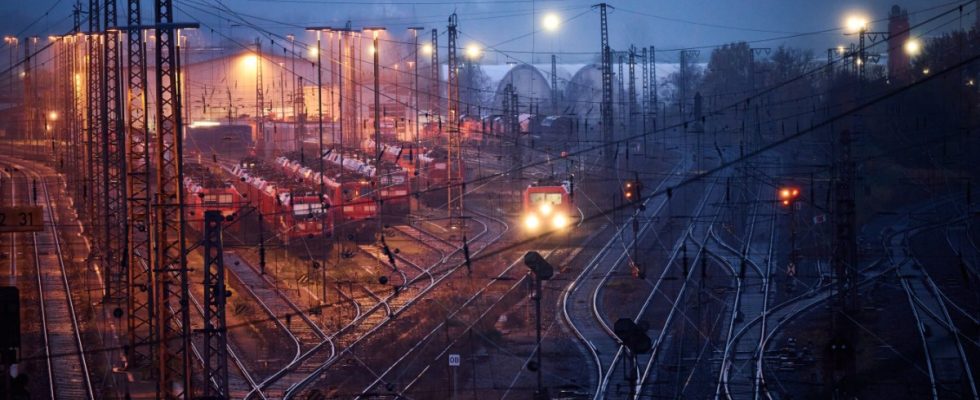While local buses and trains are being canceled all over Germany this week, there is now a threat of new, violent strikes in Deutsche Bahn’s long-distance transport. According to Deutsche Bahn, the GDL train drivers’ union broke off the talks. Both sides originally wanted to negotiate a compromise in the wage agreement by Sunday.
The biggest point of contention in the GDL collective bargaining round is a possible reduction in working hours. Union leader Claus Weselsky demands that shift workers should work 35 instead of 38 hours in the future without having to forgo their salary. This is intended to relieve train drivers and other employees and make the job more attractive. The railway did offer a reduction in working hours, but not to such an extent with full wage compensation. According to her, if the GDL requirement were implemented, she would have to hire ten percent more people. But she won’t get this because of the staff shortage, which is why there will be train cancellations.
“We were prepared to take steps to reduce working hours that went far beyond our last offer,” said Deutsche Bahn HR Director Martin Seiler. “It is unbelievable that the train drivers’ union is still standing up from the table and thus threatening further strikes for customers.” According to the railway, the GDL dogmatically insists on a 35-hour week with full wage compensation.
The GDL wants to announce details on Monday
The union shut down train services nationwide for five days at the end of January. This was the fourth strike since the collective bargaining round began in November, but the longest – and one of the longest labor disputes by train drivers in Germany. Afterwards, both sides agreed to secret negotiations that were supposed to last until this weekend and during which they did not want to comment.
Now both sides are making serious accusations against each other. The union did not comment on the status of the negotiations, citing the agreed period of silence. However, she accused the railway of passing on the failure of the talks to the Bild newspaper, which first reported. “As is well known, the GDL has not given Bild any interviews or background information for years,” explained the union, which accuses the paper of tendentious reporting.
Given the tense atmosphere between both sides, new strikes are likely. It is completely unclear when these actions might begin. Since the GDL has announced a press conference for Monday at which it will comment on the status of the negotiations for the first time, there are unlikely to be any strike announcements until then. However, the union is characterized by a certain unpredictability.
The railway did not comment on the allegations, but only on the status of the negotiations. She recently officially offered a wage increase of around 13 percent, spread over almost three years, plus an inflation bonus. In addition, from 2026 onwards, employees should be able to reduce their working hours from 38 to 37 hours and earn the same as before. They should only have to forego the last stage of the wage increase, so in their case it would have been a good ten percent.
In the secret talks, the railway went “far” beyond the last official offer, although it did not provide any details. However, the GDL has not moved a millimeter in the past four weeks. According to reports, she is calling for working hours to be reduced by one hour each year until the 35 hours are reached. There should be no loss of wages.
The railway explained that there could be no solution without compromises. “We have reached the absolute limit of what is possible financially and in terms of personnel. Demographics and a shortage of skilled workers do not allow for more, otherwise trains will stop.” In the next ten years alone, over 60 percent of the workforce will leave the railway due to age and fluctuation. A third of the train crew in the individual companies for which the GDL is negotiating are 55 years of age and older. “The job market is historically tight, every new train driver has to be found with difficulty and trained extensively.”
The mediators called in by both sides, the Schleswig-Holstein Prime Minister Daniel Günther and the former Interior Minister Thomas de Maizière (both CDU), also failed to reach a compromise. Both had successfully negotiated in previous collective bargaining rounds between railway unions. After the negotiations collapsed, the signs now point to a strike. The announcement could come as early as Monday at the GDL press conference.

